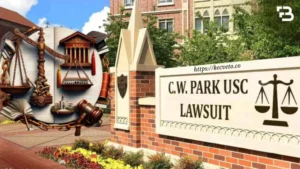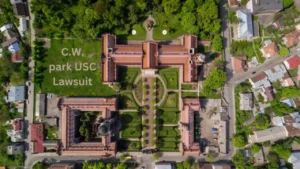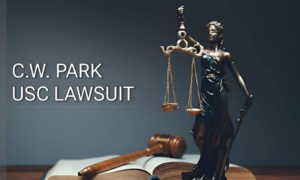In the hallowed halls of academia, wherein know-how is supposedly pursued with integrity and recognition, a dark stain has emerged. The C.W. Park USC lawsuit against the University of Southern California casts a spotlight on alleged abuse of electricity and institutional negligence, shattering the ghost of a safe and nurturing knowledge of the environment. This isn’t always only a criminal conflict, but a fight for the very material of belief between scholars and college, raising uncomfortable questions about who protects whom and at what fee. Buckle up, for this is a story of shattered innocence, institutional cover-up, and the brave voices of stressful justice.
What is the C.W. Park USC lawsuit?

The C.W. Park USC lawsuit is a complex and touchy case with several accusations and legal troubles involved. Here’s a breakdown of the important thing factors:
Who:
Plaintiffs: Former students of Professor C.W. Park at the University of Southern California (USC).
Defendant: USC and Professor Park.
Allegations:
Sexual attack and discrimination: The lawsuit alleges that Park engaged in repeated sexual attacks and harassment of multiple female students, broadly speaking of Korean descent, over several years.
Failure to behave: The lawsuit also accuses USC of understanding approximately Park’s conduct and failing to take suitable action to guard students.
Current Status
The lawsuit is ongoing, and no prison choice has been reached.
Park has denied the allegations and stays on faculty at USC.
USC has said they’re taking the allegations significantly and conducting an inner research.
Impact:
The lawsuit has raised enormous worries about sexual harassment and abuse of electricity inside academia.
It has also sparked conversations about USC regulations and methods for dealing with such allegations.
College students, colleges, and administrators at universities across the are intently watching the case. S ..
Student Vulnerability and Faculty Power
The prestigious halls of academia, in which information is meant to be pursued with integrity and respect, were tarnished by using a chilling story of alleged abuse of strength and institutional negligence. The C.W. Park USC lawsuit in opposition to the University of Southern California (USC) shines a harsh light on the power dynamics among school and college students, exposing vulnerabilities and elevating vital questions about who protects whom within the pursuit of education.
Allegations Filed Against C.W. Park and USC
The center’s allegations opposing Professor C.W. Park and USC revolve around accusations of unethical conduct and clinical misconduct. The complaint asserts that Dr. Park and his colleagues intentionally manipulated information and falsified clinical findings in published publications, casting a darkness on Dr. Park’s popularity and USC’s instructional standards. The lawsuit also claims that USC didn’t intently display Dr. Park’s experiments, pointing to capacity systemic issues in the institution.
C.W. Park USC Lawsuit: A Deeper Dive
Here’s a deeper dive into its key aspects:
The Accusations:
Sexual Harassment and Assault: Seven woman graduate students accused C.W. Park of beside-the-point conduct spanning 2006 to 2015. Allegations blanketed sexual feedback, unwanted touching, and coercion for sexual favors.
Retaliation: Some students claimed C.W. Park retaliated against people who spoke out, sabotaging their careers and academic standing.
USC’s Response:
Internal Investigation: USC carried out an internal investigation that acknowledged variety and inclusion troubles in the film manufacturing application however did no longer substantiate Park’s claims of centered discrimination.
Title IX Investigation: A next Title IX investigation was initiated, but before disciplinary measures might be enacted, Park sued USC.
Park’s Defense:
Defamation: Park countersued USC for defamation, claiming the university’s dealing with the research damaged his recognition and portrayed him as a predator or serial harasser.
Academic Freedom: Park also argued that the investigation infringed on his instructional freedom and freedom of speech.
Legal Outcome:
The lawsuit settled out of court in 2019 with no admission of wrongdoing from both birthday parties. Park retired from USC shortly after.
Unanswered Questions:
The lack of a formal felony verdict leaves questions on the truth of the accusations hanging.
USC’s management of the situation, especially the put-off in disciplinary movement, has drawn criticism.
The effect on the ladies who came forward and the capability for cultural change inside USC’s film program stays visible.
Beyond the Headlines:
The C.W. Park USC lawsuit highlights broader societal problems surrounding sexual harassment and abuse in academia and the entertainment enterprise. It raises critical questions on electricity dynamics, institutional responsibility, and the demanding situations of attaining justice within complex structures.
Context Of The Case
The C.W. Park USC Lawsuit alleges unethical actions on the part of the University of Southern California. Former USC professor Dr. C.W. Park submitted the first grievance in this situation. He claims he was unlawfully fired and labored in an opposed environment. Dr. Park alleges that USC refused to offer him due manner, engaged in discriminatory behavior, and violated instructional freedom.
Reactions And Responses From Park And USC

1. Are you regarding a specific occasion or scenario? For instance, if you’re interested in the reactions and responses from Park and USC to a current game between the two schools, I could offer you information articles, social media posts, and fan remarks.
2. Are you interested in the general dating between Park and USC? In this example, I could proportion information about the records of the contention, the cultural differences between the two colleges, and the methods in which they collaborate and compete.
3. Are you seeking out something else? Please offer me greater information about what you’re hoping to analyze, and I’ll do my best to assist!
Once you supply me with a piece of greater facts, I can tailor my response to your specific desires.
A Pattern of Predatory Behavior
At the coronary heart of the lawsuit lies the disturbing narrative of former students accusing Professor C.W. Park of sexual assault, harassment, and discrimination, mostly concentrated on girl students of Korean descent. The alleged sample of abuse paints a photo of a predator operating with impunity for years, exploiting the inherent agreement with an energy imbalance inherent inside the scholar-faculty courting.
The Scars of Silence:
The C.W. Park USC lawsuit goes beyond individual accusations, highlighting the devastating results of institutional silence and inaction. The alleged failure of USC to take suitable measures upon learning of Park’s behavior increases concerns approximately a way of life that prioritizes defensive recognition over the safety and properly-being of its students. This silence can have profound psychological and emotional outcomes on survivors, leaving them feeling isolated, unheard, and even further victimized.
Breaking the Cycle of Abuse:
The C.W. Park USC lawsuit serves as a stark reminder of the urgent want for systemic alternatives within academia. Universities ought to prioritize developing safe and inclusive environments where college students feel empowered to talk out about any form of misconduct, without fear of retaliation or judgment. This requires robust reporting mechanisms, complete schooling for schools and groups of workers on figuring out and addressing abuse, and a culture of 0 tolerance for such behavior.
Key Allegations and Claims

The C.W. Park USC lawsuit is a complicated and ongoing criminal case related to allegations of sexual harassment, educational misconduct, discrimination, and retaliation. Here’s a breakdown of the key allegations and claims:
Sexual Harassment
Allegations: Seven women graduate college students accused Dr. Park of sexual harassment and retaliation, spanning from 2006 to 2015. The accusations protected irrelevant conduct, sexually suggestive feedback, specific text messages, and coercion for sexual favors.
Response: USC investigated the allegations and located inadequate proof to support them. However, Dr. Park changed into placed on depart for a time frame. He ultimately retired in June 2018.
Academic Misconduct
Allegations: Dr. Park filed a lawsuit against USC in 2019, alleging that certain people in the Marshall School of Business engaged in instructional misconduct, along with facts manipulation, intellectual belongings theft, and sabotage of his research initiatives.
Response: USC has denied these allegations and is presently protecting itself in court.
Discrimination and Retaliation:
Allegations: Dr. Park also alleges that he was discriminated against and retaliated against after reporting the sexual harassment allegations. He claims that he was denied tenure, excluded from committees, and subjected to a opposed painting environment.
Response: USC denies these allegations and keeps that Dr. Park changed into treated pretty.
Allegations Filed Against C.W. Park and USC
The middle allegations towards Professor C.W. Park and USC revolve around accusations of unethical conduct and scientific misconduct. The complaint asserts that Dr. Park and his colleagues deliberately manipulated information and falsified scientific findings in published courses, casting a darkness on Dr. Park’s reputation and USC’s educational standards. The lawsuit also claims that USC failed to closely monitor Dr. Park’s experiments, pointing to capacity systemic problems within the institution.
The excessive fees brought outrage from the educational network, college students, and external professionals. Critics questioned how such conduct should persist at a prestigious group like USC, prompting calls for responsibility and movement toward the ones accountable. In reaction, Dr. Park and USC officials pledged thorough investigations into the situation, acknowledging the requirement for transparency.
Involved parties in the lawsuit
Lawsuits can involve numerous events, together with plaintiffs, defendants, legal professionals, judges, and occasionally third events. Additionally, the nature of the lawsuit (civil, criminal, administrative) and the jurisdiction (United States of America, kingdom, or region) play critical roles in figuring out the people involved.
If you have a particular lawsuit or kind of lawsuit in thought, please offer more info, such as the names of the parties worried, the nature of the case, and any other applicable facts. This will help me offer extra tailor-made and accurate facts about the key players in that specific criminal being counted.
Allegations Against C.W. Park and USC
C.W. Park, a former professor at the University of Southern California (USC), became embroiled in a sequence of allegations of sexual misconduct over several years. These allegations, normally in opposition to woman students, solidified a protracted shadow over the celebrated college and sparked discussions approximately institutional responsibility and management of sexual assault cases.
Current Status of the C.W. Park USC Lawsuit
By the most recent update, the CW Park USC Lawsuit stays unresolved, with ongoing criminal complaints and arguments provided with the aid of both events. The case has garnered good-sized media attention, with many intently monitoring traits. Legal professionals propose a lengthy technique, consisting of potential appeals before one remaining ruling is issued.
The outcome holds vast implications for both Professor C.W. Park and USC, impacting issues of ethics, integrity, and duty in educational institutions. To ensure an affordable decision, all parties concerned should completely cooperate with investigators and offer essential statistics and evidence to the court docket.
Key Players Involved In The Lawsuit
Lawsuits can involve various parties, including plaintiffs, defendants, attorneys, judges, and sometimes third parties. Additionally, the nature of the lawsuit (civil, criminal, administrative) and the jurisdiction (country, state, or region) play crucial roles in determining the individuals involved.
If you have a particular lawsuit or type of lawsuit in mind, please provide more details, such as the names of the parties involved, the nature of the case, and any other relevant information. This will help me offer more tailored and accurate information about the key players in that specific legal matter.
Faculty Responsibility
Faculty Responsibility: Navigating Ethics and Accountability within the Wake of the C.W. Park USC Lawsuit
The C.W. Park lawsuit against the University of Southern California (USC) has shaken the academic network, C.W. casting a highlight on the important yet regularly noted difficulty of faculty obligation in preventing and addressing the abuse of electricity. While the legal proceedings and USC inner research unfold, it’s critical to look at the ethical and professional responsibilities faculty contributors maintain in developing and safeguarding safe getting-to-know environments for students.
A Duty of Care:
Beyond the classroom partitions, college individuals hold a fundamental obligation toward their students. This obligation of care extends past educational guidance and encompasses ensuring their physical and emotional well-being. Recognizing the energy dynamics inherent in the pupil-college relationship is key. Students frequently input those spaces with trust and vulnerability, making them prone to manipulation and exploitation. Therefore, faculty must act as responsible mentors and advocates, fostering a safe and respectful environment where students are empowered to talk out against any misconduct.
Red Flags and Reporting Responsibilities:
Faculty individuals, by way of virtue of their close interactions with college students, are regularly placed to pick out ability symptoms of abuse. Observing adjustments in scholar behavior, academic performance, or emotional well-being may be vital red flags. However, recognizing those symptoms requires attention to the dynamics of strength and control that can be found in abusive conditions.
Once issues are raised, faculty participants must document suspected misconduct directly and correctly. This involves following hooked-up university reporting protocols even as ensuring confidentiality and guidance for the affected student. By failing to report, school participants risk enabling similar damage and probably becoming complicit in the abuse.
Conclusion
The C.W. Park lawsuit isn’t always only a legal struggle; it’s a seismic event that has shattered the illusion (USC) of a pristine C.W. educational landscape and exposed a dark underbelly of power imbalances and institutional screw-ups. As the dirt settles, we stand at a crossroads, pressured to confront uncomfortable truths and grapple with the query: Will academia choose to study and evolve, or will it stay complicit in the silencing of its college students?
FAQ,s
Q: What is the C.W. Park USC lawsuit about?
A: The C.W. Park lawsuit is a felony case filed in opposition to the University of Southern California (USC) and Professor C.W. Park using former students. The plaintiffs allege that Park engaged in sexual assault, harassment, and discrimination towards them, more often than not targeting woman college students of Korean descent, over several years.
Q: What are the principal allegations in opposition to Park?
A: The lawsuit alleges that Park engaged in a pattern of non-consensual touching, hugging, kissing, and groping, followed by sexual comments about the students’ bodies. It additionally claims that Park made discriminatory remarks and created a hostile knowledge of the environment for his college students.
Q: What is USC’s role in the lawsuit?
A: USC has denied the allegations toward Park and is challenging an inner investigation. The university has stated that it takes all allegations of misconduct critically and is devoted to imparting steady and inclusive learning surroundings for all university college students.
Q: What is the present-day reputation of the lawsuit?
A: The lawsuit is ongoing, and no prison desire has been reached. Both aspects are inside the discovery phase, gathering evidence and getting ready for trial.
Q: What are the potential results for Park and USC?
A: If determined guilty of the allegations, Park should face legal penalties and disciplinary motion from USC, consisting of termination of his employment. USC could also face financial and reputational damage.